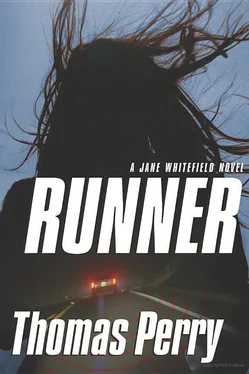Thomas Perry - Runner
Здесь есть возможность читать онлайн «Thomas Perry - Runner» весь текст электронной книги совершенно бесплатно (целиком полную версию без сокращений). В некоторых случаях можно слушать аудио, скачать через торрент в формате fb2 и присутствует краткое содержание. Жанр: Старинная литература, на английском языке. Описание произведения, (предисловие) а так же отзывы посетителей доступны на портале библиотеки ЛибКат.
- Название:Runner
- Автор:
- Жанр:
- Год:неизвестен
- ISBN:нет данных
- Рейтинг книги:3 / 5. Голосов: 1
-
Избранное:Добавить в избранное
- Отзывы:
-
Ваша оценка:
- 60
- 1
- 2
- 3
- 4
- 5
Runner: краткое содержание, описание и аннотация
Предлагаем к чтению аннотацию, описание, краткое содержание или предисловие (зависит от того, что написал сам автор книги «Runner»). Если вы не нашли необходимую информацию о книге — напишите в комментариях, мы постараемся отыскать её.
Runner — читать онлайн бесплатно полную книгу (весь текст) целиком
Ниже представлен текст книги, разбитый по страницам. Система сохранения места последней прочитанной страницы, позволяет с удобством читать онлайн бесплатно книгу «Runner», без необходимости каждый раз заново искать на чём Вы остановились. Поставьте закладку, и сможете в любой момент перейти на страницу, на которой закончили чтение.
Интервал:
Закладка:
Behind him, Jane could see the other cops escorting Ketter away. Beyond the shops, there was an unmarked steel door on the left wall, with a keypad. One of the cops punched the keys and they opened the door and pulled him inside. "Thank you so much," said Jane. "You were so quick. You probably saved my life."
The officer shrugged, and Jane hurried off down the concourse. Jane knew she still had a problem. Ketter had called someone, and she had no idea who it was or what they looked like. But Ketter would certainly have described her to them.
Jane kept going along the concourse, then came to another row of shops. The first was a newsstand, the next a place that sold nothing but baseball caps. The next store sold golf clothes and accessories. She bought a white sweater, a blue nylon windbreaker, a pair of khaki golf pants with a sharp crease in them, and a straw hat shaped like a man's panama hat. She moved on until she found the next ladies' room, changed her clothes, and stuffed the jeans and sweater she had been wearing into her shopping bag, and then spent a few minutes getting her long hair hidden under the hat. She looked as unlike herself as she could on short notice. From a distance, outside in the dim light, she hoped she might even look ambiguous enough to be mistaken for a man.
As she went toward the escalator that would take her down to street level, she put together the little she knew. Ketter had said he wanted to walk her out through the baggage claim, so he had probably told his people to wait there. Being there would be of no use without having a car waiting at the curb to take her away. Jane went down the escalator, turned to her left away from the baggage claim, and walked to the lobby, where there were ticket counters. She could see the traffic outside in the circular drive was moving from left to right across the windows, so she kept going to the left. If any watcher saw her, they couldn't back the car two hundred yards to push her into it. She went out the last door of the terminal and walked to the next one before she got on the shuttle for the rental car lots. She sat on the bench seat on the right side of the shuttle near the driver, so her back would be to the terminal. When the shuttle made its first stop, Jane stepped down and went into the rental agency without caring which one it was.
She rented a car and drove from Long Island to New Jersey, crossed into Pennsylvania and took the Pennsylvania Turnpike to Harrisburg before she turned north into New York State and made her way north toward Rochester. Along a rural road she spotted a thicket of sumac bushes, so she stopped, broke off a few twigs, and took them with her. Late in the morning she stopped at a tobacco store on a plaza on West Henrietta Road and went inside to look around. There were lots of cigars behind the glass wall along the back, a supply of the usual kinds of cigarettes and pipe tobaccos, and a glass case that held lighters, pipes, cigar cutters, and cigarette cases, but Jane knew what she was looking for. She went to the rack where packs of exotic cigarettes were sold, and picked out two packs. The brand name was Seneca. The cigarettes were made by Grand River Enterprises, a company based on the Six Nations Reserve in Ontario, of tobacco that was grown, cut, and hung to dry in sheds on the Cattaraugus Reservation in New York. She brought the cigarettes to the cash register, and the tall, bald man who owned the store took her money and put the cigarettes into a small brown bag. She wondered if he remembered her from other times, but she preserved their impersonal relationship by not asking.
In the drugstore across the small plaza she bought a set of fingernail clippers and a newspaper. When she returned to her rental car she spread the front section of the newspaper on her lap, trimmed her fingernails, and poured the clippings along the crease in the paper into her bag with the cigarettes. Then she drove on up Henrietta.
It was nearly noon when Jane drove into the middle of the city and turned off onto a quiet, narrow street called Maplewood Avenue. At this time of day the sun was high enough so the spreading canopies of the tall trees on both sides threw the pavement into shadow. She left the rental car at the curb and walked down the street past the two rows of big old houses, all of them three stories, with steep peaked roofs. They were all edged right up to the sidewalk, built in the days when lawns were not of much interest. In those days people liked to have a carriage pull right up to the front of the house so a lady would not get mud on her thin shoes or the hem of her dress.
The houses had been built big to hold lots of children and a few servants, but as the world changed, many of them had been partitioned into apartment buildings, with extra kitchens and bathrooms where the original builders never intended them to be.
Jane walked to the end of the street to the long, narrow, quiet park that began at the white Romanesque Christian Science church and ran beside the street for a few hundred feet. Along the far edge of the park was a steel railing to keep people from falling off the cliff into the Genesee River below. The Genesee River was like an artery that ran down the center of Nundawaonoga, and if she stopped walking she could hear it running just beyond the edge of the park, past the railing.
This was one of the places where Jane sometimes stopped after she had been on the road. Until the 1770s there had been a big Seneca village here. There were dozens of Seneca village sites in the land between Sodus Bay on Lake Ontario and the Niagara River, but this was one of her favorites because it was so quiet and empty during the day, even though it was in the center of a busy city. There was only Jane walking toward the edge of the park beneath the tall shade trees, listening to the wind moving through their leaves. She reached it, looked back over her shoulder to be sure she was alone, and climbed over the railing.
The bank was high, at least thirty feet above the Genesee River, but she had been here a number of times, and she could see that the way she had found to get down to the river was still passable. It didn't deserve the name of path. It was just a slight protuberance, a stony shelf in the gray shale along the side of the cliff set at a gradual angle to lead her down. She had to use a series of thin saplings that grew out of the cliffside as handholds, but in a minute she was at the bottom of the gorge walking on the dry pebbly ground along the river. The water was deep enough at midstream to move in lazy silence to the north where it would flow into Lake Ontario, so she could hear small birds chirping in the trees far above.
Along the riverbed the river was wider and shallower and there were some flat stones big enough to sit on. She could hear a faint sound of the water moving over pebbles here. She opened her shoulder bag, took out the bag of cigarettes she had bought, opened the two packs, and sniffed the strong, fragrant aroma. She tore the paper on each cigarette and emptied the shreds of tobacco onto the rock, then took out her broken sumac twigs. She peeled them, crumbled the bark, dropped it into the tobacco and used a twig to mix it. Then she shook the fingernail clippings out of the paper bag onto the rock beside the tobacco.
She said aloud, "Jo-Ge-Oh." That was the name of the little people. "Jo-Ge-Oh. Grandfathers." The little people were only a few inches tall, but they were a very ancient race. They had already lived in the gorge of the Genesee when the Nundawaono had come into being on the big hill at the foot of Canandaigua Lake near Naples, New York, so they were properly called grandfathers and grandmothers.
Jane had always felt close to them, because they were compassionate and performed a particular service to human beings who came to them in trouble. The Jo-Ge-Oh would reveal themselves to people who were hunted, and spirit them away from the human world to live with them for a time. When they felt that the moment was right, they would return the person to the place where he had met them. To the fugitive it would seem that he had been with the Jo-Ge-Oh for only a few hours or a day, but when he walked home, he would find that so much time had passed that his enemies were dead.
Читать дальшеИнтервал:
Закладка:
Похожие книги на «Runner»
Представляем Вашему вниманию похожие книги на «Runner» списком для выбора. Мы отобрали схожую по названию и смыслу литературу в надежде предоставить читателям больше вариантов отыскать новые, интересные, ещё непрочитанные произведения.
Обсуждение, отзывы о книге «Runner» и просто собственные мнения читателей. Оставьте ваши комментарии, напишите, что Вы думаете о произведении, его смысле или главных героях. Укажите что конкретно понравилось, а что нет, и почему Вы так считаете.












